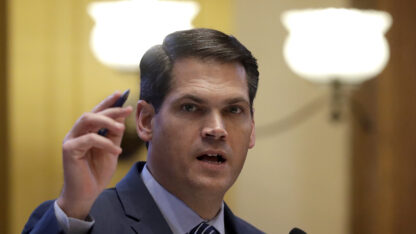A bipartisan group of Georgia lawmakers is trying to change the state’s election rules to add a party primary in the special election U.S. senate race. That race is to fill the seat formerly held by Sen. Johnny Isakson.
Despite the bipartisan support, the idea is not without controversy, as Gov. Brian Kemp has vowed to veto it.
As it stands, the Senate seat, now held by Kemp’s appointee Sen. Kelly Loeffler, is up for election in November without a party primary. It’s known as a “jungle primary,” which means multiple Democrats and Republicans could be on the ballot at once.
The move to change that situation by adding a party primary was introduced in a state House subcommittee by Republican Rep. Shaw Blackmon in the form of a substitute to an existing bill, HB 757.
Responding to a question about why there was a need to change the rules at this time, Blackmon said, “We’re lawmakers. We change the rules all the time.”
“I think it really boils down to whether you believe in the party process and what way voices can best be heard,” he said. “I think you can choose to look at this through whatever prism you’d like; personality or prism, it’s our job to look at whether this is good public policy.”
Blackmon was questioned by fellow Republican Rep. Scot Turner, who argued the move was political.
“Let’s pull the curtain back on behalf of the people of Georgia and why this is actually happening,” he said. “We have a situation where [House Speaker David Ralston] will criticize members of his own caucus for working with Democrats at certain times, and then we have a situation where he’s willing to work with Democrats in this case because he doesn’t like a decision the Governor made.”
Kemp’s spokeswoman Candice Broce likened the proposal to changing “the rules at half time to benefit one team over another. People are sick and tired of it. The Governor will veto any bill that attempts to undermine the rule of law for perceived political gain.”
If two-thirds of members of each chamber of the legislature agree, they can override a governor’s veto.
Turner said in the subcommittee he was “hesitant” about changing the law “because of one person’s opinion.”
In a statement, Ralston said the special election should “mirror” that of other offices up for election this year.
“The underlying principle of this legislation is a fair, comparable playing field for all those seeking elected office. Surely that is something we can all agree on,” he said.
Ralston argued the new substitute to the bill fits with its original intent, which was to clarify the Secretary of State’s authority to set qualifying periods for special elections, like Loeffler’s.
“I agree with Secretary of State Raffensperger that this bill provides voters with order and certainty,” Ralston said. Raffensperger could not be reached for comment regarding his stance on the updated bill.
Turner and the bill’s original sponsor, Rep. Barry Fleming, were the lone “no” votes in the subcommittee. Fleming and Turner both agreed they’re open to the idea of eliminating the jungle primary, just in a separate bill, and not in a way that applied to the current election.
“When I introduced this bill, I talked with several people about it, including the chairman, and it was my commitment to everybody involved that I would keep it a clean bill,” Fleming said.
Democrats on the committee voted for the bill, and Democratic Minority Leader Bob Trammell said this “gives the voters the maximum chance to weigh in.”
“I think this is an effort to bring the most democratic, small d, process to bear for the U.S. Senate election.”
“I think there’s no question that having a traditional general election where you have one candidate from each party offers voters the best chance to do a side-by-side comparison,” he said. “And Democrats feel very good about the prospects in November if we have that one-on-one opportunity.”
The bill is now before the House Governmental Affairs Committee.








